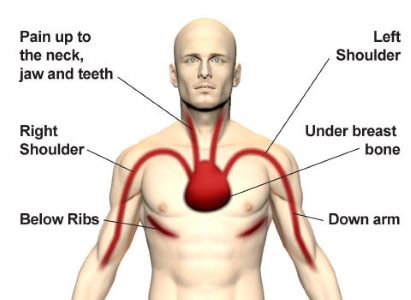Unstable angina or
sometimes referred to as acute
coronary syndrome causes
unexpected chest pain,
and usually occurs while
resting. The most common
cause is reduced blood
flow to the heart muscle
because the coronary
arteries are narrowed by
fatty buildups
(atherosclerosis) which
can rupture causing
injury to the coronary
blood vessel resulting
in blood clotting which
blocks the flow of blood
to the heart muscle.
Unstable angina should
be treated as an
emergency. If you have
new, worsening or
persistent chest
discomfort, you need to
go to the ER. You could
be having a heart
attack which puts you at
increased risk for
severe cardiac arrhythmias or cardiac
arrest, which could lead
to sudden death.
Causes of Unstable
Angina:
Blood clots that block
an artery partially or
totally are what causes
unstable angina. Blood
clots may form,
partially dissolve, and
later form again and
angina can occur each
time a clot blocks blood
flow in an artery. Learn
more about excessive
blood clotting.
Symptoms of Unstable
Angina
The pain or discomfort:
-
Often occurs while
you may be resting,
sleeping, or with
little physical
exertion
-
Comes as a surprise
-
May last longer than
stable angina
-
Rest or medicine
usually do not help
relieve it
-
May get worse over
time
-
Can lead to a heart
attack
Prinzmetal's or
Prinzmetal Angina,
Variant Angina and
Angina Inversa
Unlike typical angina –
which is often triggered
by exertion or emotional
stress – Prinzmetal’s
angina almost always
occurs when a person is
at rest, usually between
midnight and early
morning. These attacks
can be very painful.
Prinzmetal angina may
also be referred to as:
-
Variant angina
-
Prinzmetal's variant
angina
-
Angina inversa
Prinzmetal’s angina is
rare, representing about
two out of 100 cases of
angina, and usually
occurs in younger
patients than those who
have other kinds of
angina.
Causes of Variant
(Prinzmetal) Angina: The
pain from variant angina
is caused by a spasm in
the coronary arteries
(which supply blood to
the heart muscle).
The coronary arteries
can spasm as a result
of:
-
Exposure to cold
weather
-
Stress
-
Medicines that
tighten or narrow
blood vessels
-
Smoking
-
Cocaine use
Symptoms of Variant
(Prinzmetal) Angina:
The pain or discomfort:
-
Usually occurs while
resting and during
the night or early
morning hours
-
Are usually severe
-
Can be relieved by
taking medication
Microvascular Angina
This type of angina, or
chest pain, may be a
symptom of coronary
microvascular disease
(MVD). Coronary MVD is
heart disease that
affects the heart’s
smallest coronary artery
blood vessels.
Causes of microvascular
angina: Spasms within
the walls of these very
small arterial blood
vessels causes reduced
blood flow to the heart
muscle leading to a type
of chest pain referred
to as microvascular
angina.
Symptoms of
microvascular angina:
Angina that occurs in
coronary MVD may differ
from the typical angina
that occurs in heart
disease in
that the chest pain
usually lasts longer
than 10 minutes, and it
can last longer than 30
minutes. If you have
been diagnosed with MVD,
follow the directions
from your healthcare
provider regarding how
to treat your symptoms
and when to seek
emergency assistance.
|
The pain or
discomfort:
-
May be
more
severe
and last
longer
than
other
types of
angina
pain
-
May
occur
with
shortness
of
breath,
sleep
problems,
fatigue,
and lack
of
energy
-
Often is
first
noticed
during
routine
daily
activities
and
times of
mental
stress
|
Talk to Your
Doctor
|



